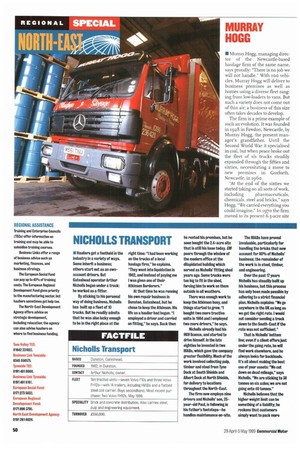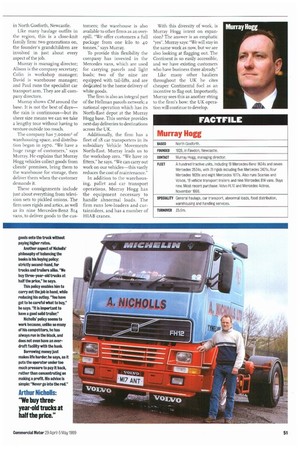NICHOLLS TRANSPORT
Page 52

Page 53

If you've noticed an error in this article please click here to report it so we can fix it.
II Hauliers get a foothold in the industry in a variety of ways. Some inherit a business; others start out as an ownaccount drivers. But Gateshead operator Arthur Nicholls began under a truck: he worked as a fitter.
By sticking to his personal way of doing business, Nicholls has built up a fleet of 10 trucks. But he readily admits that he was also lucky enough to be in the right place at the right time: "I had been working on the trucks of a local haulage firm," he explains. They went into liquidation in 1982, and instead of paying me I was given one of their Atkinson Borderers."
At that time he was running his own repair business in Dunston, Gateshead. but he chose to keep the Atkinson. His life as a haulier had begun. '1 employed a driver and carried on fitting," he says. Back then
he rented his premises, but he soon bought the 2.4-acre site that is still his base today. CM peers through the window of the modern office at the dilapidated building which served as Nicholls' fitting shed years ago. Some trucks were too big to fit in the shed, forcing him to work on them outside in all weathers.
There was enough work to keep the Atkinson busy, and things started to grow. "I bought two more tractive units in 1984 and I employed two more drivers," he says.
Nicholls already had his HGV licence, and started to drive himself. In the late eighties he invested in two HIABs, which gave the company greater flexibility. Much of the work involved collecting pulp, timber and steel from Tyne Dock at South Shields and Albert Dock at North Shields, for delivery to locations throughout the North-East.
The firm now employs nine drivers and Nicholls' son, 25year-old Paul, is following in his father's footsteps—he handles maintenance on-site. The HIABs have proved invaluable, particularly for handling the bricks that now account for 80% of Nicholls' business; the remainder of the work is in steel, timber, and engineering.
Over the past 17 years Nicholls has steadily built up his business, but this process has only been made possible by adhering to a strict financial plan. Nicholls explains: "We go anywhere in the UK as long as we get the right rate. I would not consider sending a truck down to the South-East tithe rate was not sufficient."
That is Nicholls' bottom line; even if a client offers just under the going rate, he will find work elsewhere, and he always looks for backloads. Ifs all about making the best use of your assets: "We cut down on dead mileage," says Nicholls. "We are sticking to 38 tonnes on six axles; we are not going onto 40 tonnes."
Nicholls believes that the higher weight limit can be something of a liability; he reckons that customers simply want to pack more
goods onto the truck without paying higher rates.
Another aspect of Nicholls' philosophy of balancing the books is his buying policy: strictly second-hand, for trucks and trailers alike. "We buy three-year-old trucks at half the price," he says.
This policy enables him to carry out the job in hand, while reducing his outlay. "You have got to be careful what to buy," he says. "It is important to have a good solid trailer."
Nicholls' policy seems to work because, unlike so many of his competitors, he has always run in the black, and does not even have an overdraft facility with the bank.
Borrowing money just makes life harderr, he says, as it puts the operator under too much pressure to pay it back, rather than concentrating on making a profit. His advice is simple: "Never go into the red."




















































































































